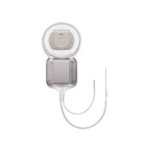Dr. Jace Wolfe, clinical audiologist and Director of Audiology and Research at the Hearts for Hearing Foundation in Oklahoma City, uses his 22 years of cochlear implant experience to examine results from the Longitudinal Outcomes of Children with Hearing Impairment (LOCHI) Study based out of Australia to understand the long-term impact of age at implantation. The March 2020 FDA approval to expand pediatric indications to nine months further reinforces the urgency to give pediatric patients early access to sound, especially as they reach hearing and language milestones.
Moreover, the LOCHI study observed children from the age of hearing loss identification until early adulthood to explore speech, language, literacy, auditory, educational, vocational, social and pragmatic outcomes. Wolfe further recaps the factors that may influence hearing outcomes such as age of implantation.
Key finding of the LOCHI Study:
- For every 6-month delay in implantation there’s a ½ standard deviation (about seven points from the mean score for a standardized measure of language ability) reduction in their language outcomes.1,2
This suggests the presence of a critical window for language development and auditory stimulation. Through partnership, together we can reach further to give pediatric patients early access to sound.
“Every moment within that critical period counts,” Wolfe concludes.
To learn more about early implantation visit our TECH Talks page or website.
References:
- Ching, T.Y., Dillon, H., Leigh, G., & Cupples, L. (2018). Learning from the longitudinal outcomes of children with hearing impairment (LOCHI) study: summary of 5-year findings and implications. International Journal of Audiology, 57(2), S105-S111.
- Ching, T.Y., Dillon, H., Button, L., Seeto, M., Buynder, P.V., Marnane, V., Cupples, L., & Leigh, G. (2017). Age at Intervention for Permanent Hearing Loss and 5-Year Language Outcomes. Pediatrics, 140 3.
In the US, the cochlear implant system is intended for use in children 9 to 24 months of age who have bilateral profound sensorineural deafness and demonstrate limited benefit from appropriate binaural hearing aids. Children two years of age or older may demonstrate severe to profound hearing loss bilaterally. In the Canada, the cochlear implant system is intended for use in children 12 to 24 months of age who have bilateral profound sensorineural deafness and demonstrate limited benefit from appropriate binaural hearing aids. Children two years of age or older may demonstrate severe to profound hearing loss bilaterally.


